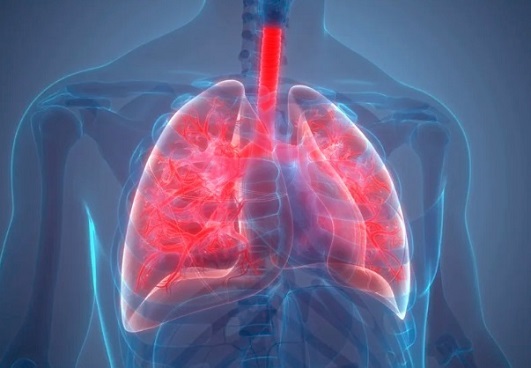Doctors in Brazil Warns That HMPV Can Cause Severe Pneumonia Even in Healthy Adults
Nikhil Prasad Fact checked by:Thailand Medical News Team Jan 07, 2025 11 months, 1 week, 1 hour, 21 minutes ago
Medical News: In a concerning development, medical experts in Brazil are shedding light on the significant risks posed by the human metapneumovirus (hMPV), a respiratory virus often overshadowed by its more infamous counterparts like influenza and SARS-CoV-2. Recent findings reveal that hMPV can trigger severe pneumonia even in healthy, immunocompetent adults. This alarming revelation comes from a detailed case study conducted by researchers at institutions such as the Oswaldo Cruz Institute/FIOCRUZ, Pró-Cardíaco Hospital, and the D’Or Institute Research and Education (IDOR) in Rio de Janeiro, Brazil.
 Doctors in Brazil Warns That HMPV Can Cause Severe Pneumonia Even in Healthy Adults
Doctors in Brazil Warns That HMPV Can Cause Severe Pneumonia Even in Healthy Adults
While hMPV was first identified in 2001, serological evidence indicates its presence in human populations as far back as the 1950s. Despite this, the virus remains underdiagnosed and underappreciated, particularly in adult populations. This
Medical News report delves into the findings of the Brazilian study, which underscores the need for heightened clinical awareness and robust diagnostic tools to combat this emerging respiratory threat.
The Study in Focus
The Brazilian case study highlights a 68-year-old physically active male with no significant comorbidities who developed severe community-acquired pneumonia (CAP) due to hMPV. The patient, a non-smoker with a history of mild hypertension and dyslipidemia, initially presented with mild respiratory symptoms, including a dry cough and sore throat. However, these symptoms rapidly progressed over a week, culminating in severe coughing, bronchospasm, and significant fatigue.
Upon admission to the emergency department, clinical evaluations revealed elevated inflammatory markers, mild thrombocytopenia, and imaging findings consistent with viral pneumonia. Molecular testing via a multiplex reverse-transcription polymerase chain reaction (RT-PCR) panel confirmed hMPV as the sole pathogen. This case, published in Microorganisms, emphasizes the often-overlooked role of hMPV in adult pneumonia cases.
What is Human Metapneumovirus?
Human metapneumovirus belongs to the Pneumoviridae family, sharing close genetic ties with respiratory syncytial virus (RSV). It spreads through respiratory droplets, close contact, and contaminated surfaces, making it a significant concern in crowded environments such as healthcare facilities. Symptoms of hMPV infection range from mild upper respiratory issues, like nasal congestion and cough, to severe lower respiratory complications, including bronchitis and pneumonia.
While severe cases are more commonly observed in children, the elderly, and immunocompromised individuals, the Brazilian study reveals that healthy adults are not immune to the virus's potentially life-threatening consequences.
Key Findings of the Study
-Clinical Presentation
The patient’s journey began with mild symptoms on Day 1 (D1), which progressively wor
sened. By Day 7, he required hospitalization due to hypoxia, intense bronchospasm, and debilitating fatigue. Laboratory tests showed elevated C-reactive protein (7.6 mg/dL) and D-dimer (870 ng/mL) levels, indicative of an inflammatory response, while imaging revealed significant pulmonary involvement. Thoracic CT scans displayed bilateral pleural effusions, ground-glass opacities, and areas of consolidation, particularly in the left upper and lower lobes.
-Diagnostic Breakthrough
Molecular diagnostics played a pivotal role in identifying hMPV as the causative agent. The RT-PCR assay not only confirmed the viral etiology but also excluded bacterial and other viral pathogens, thereby guiding the patient’s management. Despite this, empirical antibiotic therapy was initially administered, reflecting the challenges in differentiating between bacterial and viral infections in clinical practice.
-Treatment and Recovery
The patient received a combination of oxygen therapy, nebulization with bronchodilators, intravenous moxifloxacin, and physiotherapy. His condition stabilized within 24 hours, and he was discharged on oral antibiotics for continued recovery. By Day 14 post-discharge, the patient had fully recovered, highlighting the importance of supportive care in managing hMPV-related pneumonia.
Broader Implications
-Underdiagnosed Burden
The Brazilian study underscores a critical gap in the global understanding of hMPV. Despite its significant contribution to CAP cases, particularly during seasonal respiratory surges, hMPV remains underdiagnosed due to overlapping symptoms with other pathogens. Incorporating hMPV testing into routine clinical protocols could significantly improve diagnostic accuracy and resource utilization.
-Radiological Insights
The study also highlights the characteristic imaging findings of hMPV pneumonia, such as ground-glass opacities and bilateral consolidations. These radiological features, while typical of viral pneumonia, often overlap with other respiratory infections, necessitating precise diagnostics.
Vaccine Development
Efforts to develop vaccines targeting hMPV are gaining momentum. The investigational bivalent vaccine IVX-A12, currently in phase II trials, is designed to protect against both hMPV and RSV. Such advancements offer hope for reducing the disease burden and improving prevention strategies.
Conclusions
The findings from this study are a wake-up call for the global medical community. hMPV, though often overshadowed by other respiratory viruses, poses a significant threat to public health, particularly in older adults and during seasonal respiratory outbreaks. The case underscores the critical role of rapid molecular diagnostics in identifying under-recognized pathogens, enabling timely and targeted clinical management.
Radiological evidence, combined with molecular diagnostics, can significantly improve diagnostic accuracy, reducing unnecessary antibiotic use and enhancing patient outcomes. However, the study also highlights the persistent diagnostic challenges posed by overlapping symptoms and radiological findings between viral and bacterial infections.
Addressing the global burden of hMPV requires sustained investment in diagnostics, therapeutics, and vaccine development. Public health efforts must focus on integrating hMPV testing into routine diagnostic workflows, raising awareness among healthcare providers, and ensuring equitable access to emerging diagnostic and preventive tools.
The study findings were published in the peer-reviewed journal: Microorganisms.
https://www.mdpi.com/2076-2607/13/1/73
For the latest HMPV News, keep on logging to Thailand
Medical News.
Read Also:
https://www.thailandmedical.news/news/doctors-warn-that-hmpv-can-trigger-deaths-in-children-with-covid-19
https://www.thailandmedical.news/articles/hmpv-human-metapneumovirus
https://www.thailandmedical.news/news/french-researchers-warn-that-hmpv-infections-could-possibly-cause-chronic-lymphocytic-leukemia-like-lymphocytosis
https://www.thailandmedical.news/news/in-2021-new-hmpv-variants-emerged-in-spain-drove-disease-severity-yet-no-genomic-surveillance-of-what-is-happening-today
